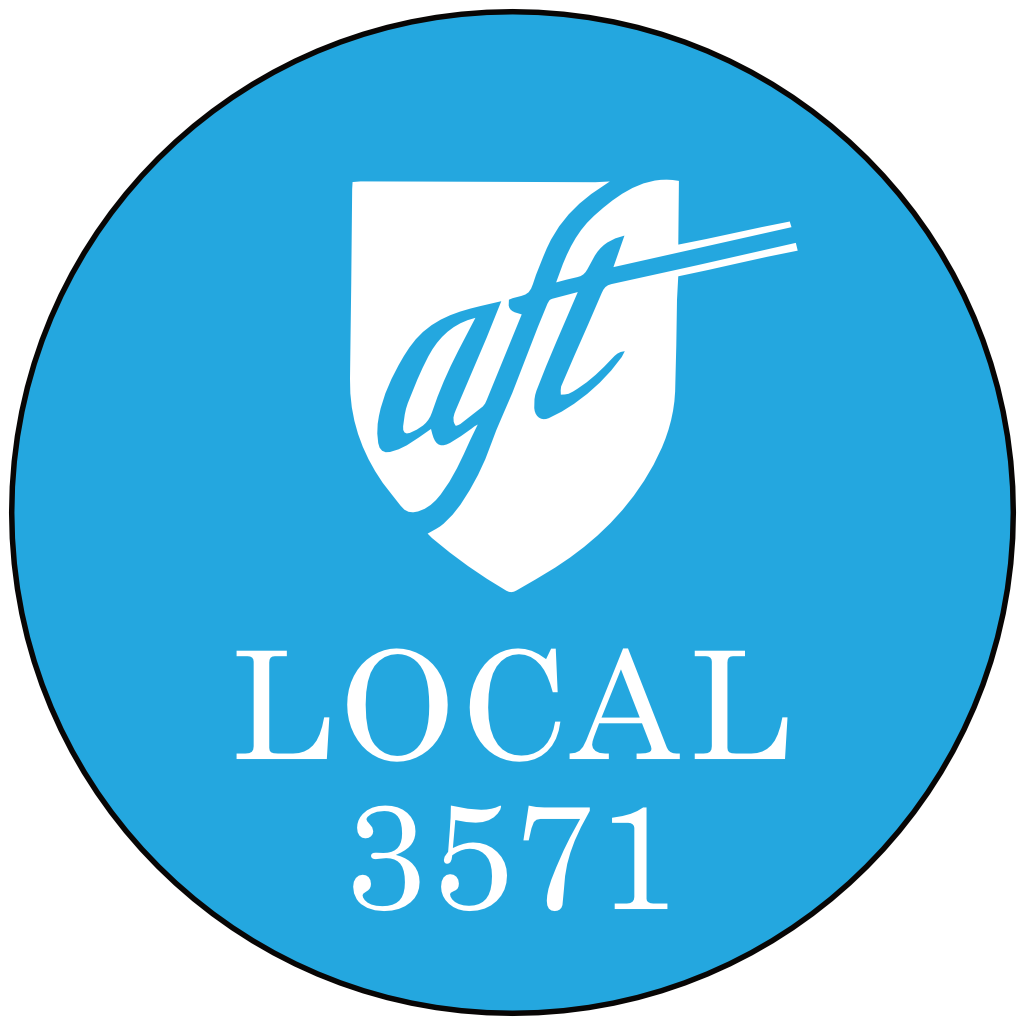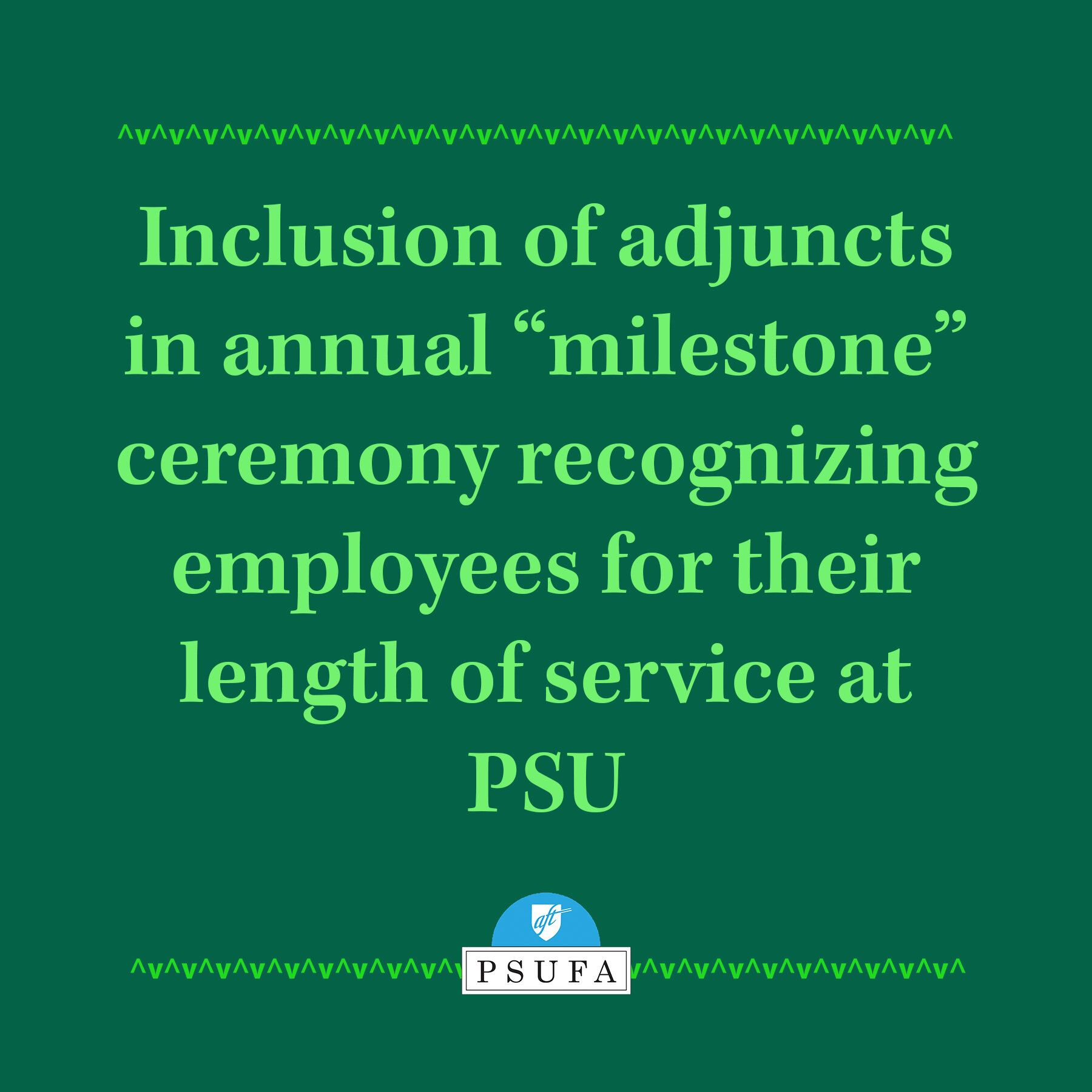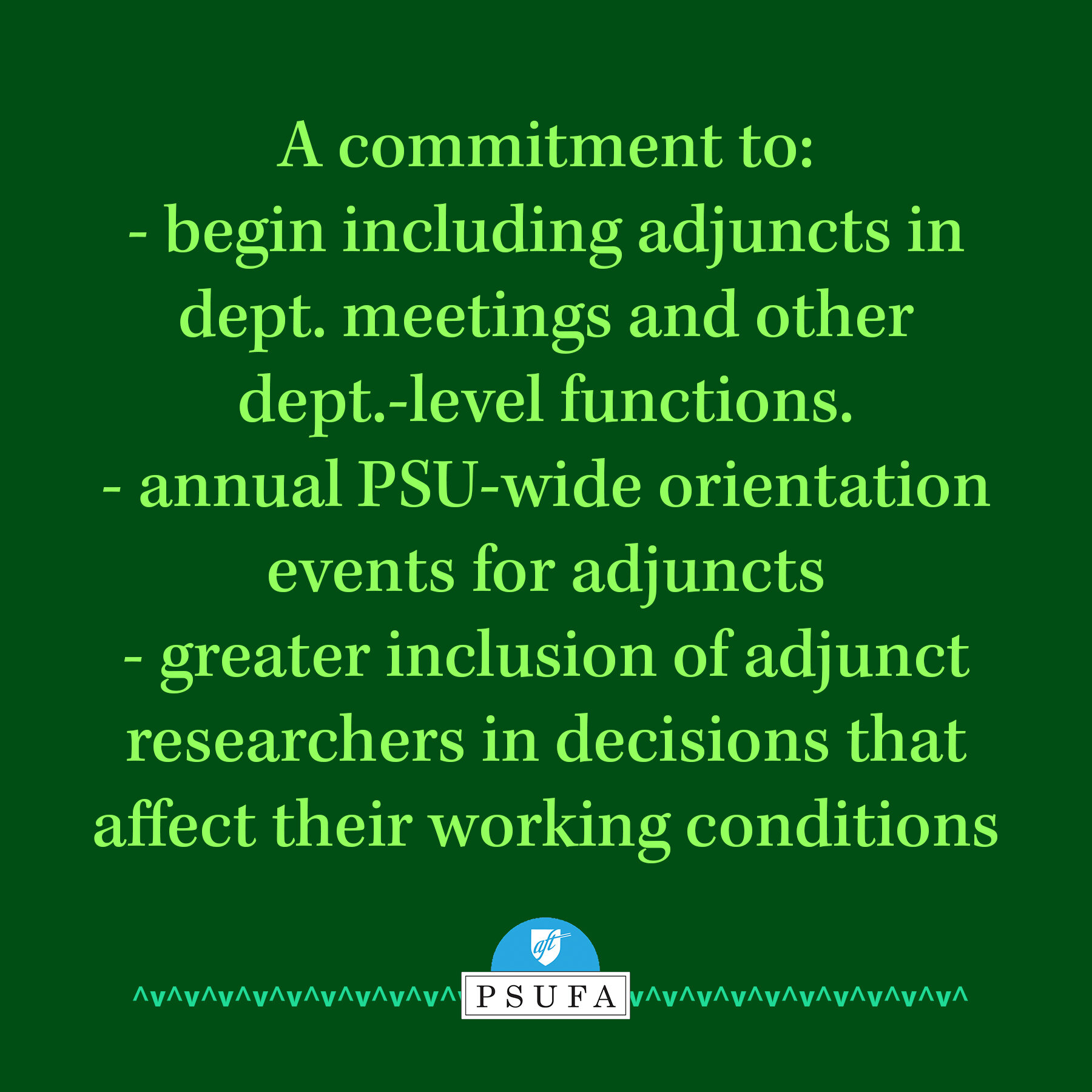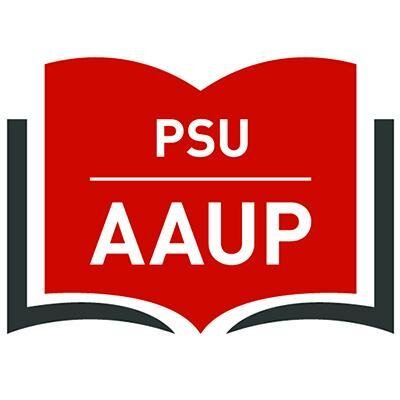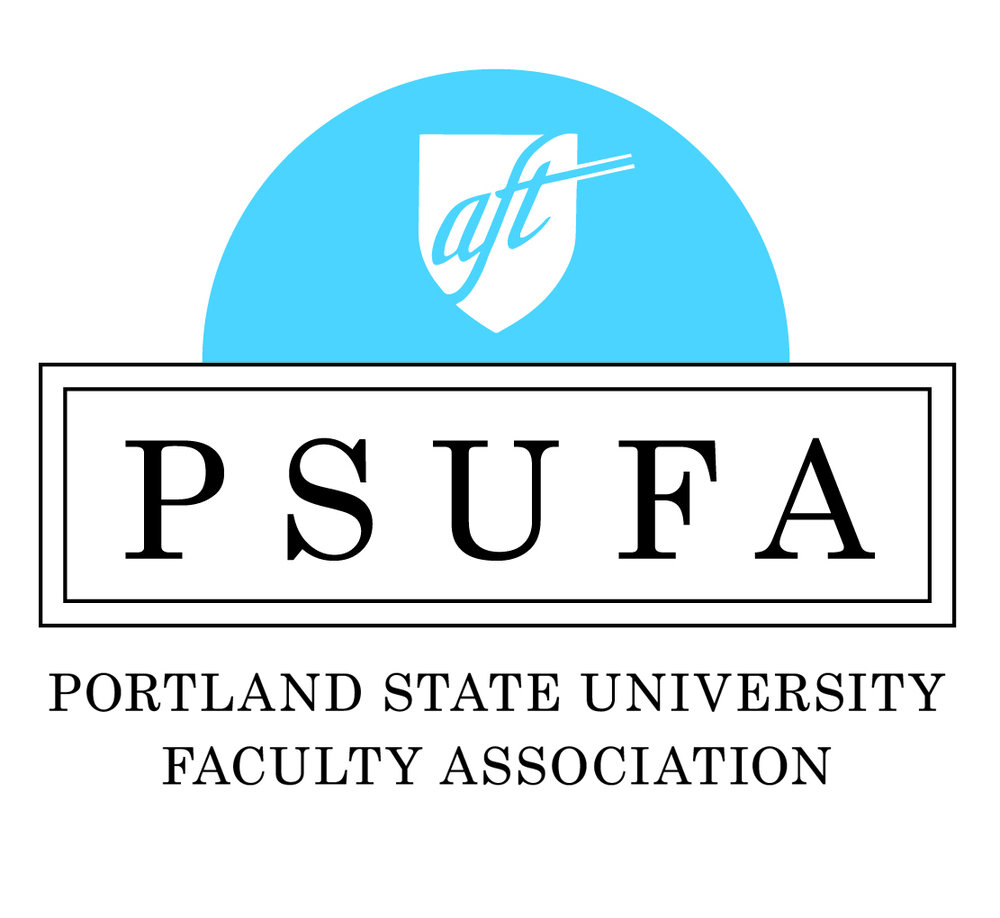On Friday, September 25, 2020, PSUFA held our first virtual orientation in conjunction with PSU. It went really well! We shared a ton of resources for both new and returning adjuncts. Although much of this information is available on our website, we still wanted to share everything discussed for those who couldn’t make it. We have a short recap here. Thanks to everyone who came, and to our PSU guests for sharing resources.
PSUFA Introduction
PSU Is a Union University
There are multiple unions that make up PSU. One way to think about unions is that they are “tiny democracies.” PSUFA has elected council positions. We advocate for our members. We administer benefits (more on that later). We negotiate for better pay and benefits. We work to improve your position at PSU (and as adjuncts, our conditions can always be improved). There are roughly 1,300 to 1,400 adjuncts who teach at PSU. We are by far the largest group of people who teach at PSU and are essential to how the university runs and functions. The other two teaching unions are AAUP and GEU. To become a member sign up here: https://awa.knack.aft.org/online-membership#psufa-member/
Union membership meetings
These are like our town halls. They take place every term. This is where you can share your input as a union member. We want to know what you want us to work on, or bargain for, or put our time toward. We make decisions based on what our members want us to do.
Bargaining
We’re bargaining for fair pay, more security and better working conditions right now. It’s a very long process! You can join us at the bargaining table by being an observer. Click here for more information.
Annual Reports
Check out all of our annual reports—including the latest from the 2019-20 year—online here.
PSU Resources
Office of Information Technology (presented by Kirk Kelly, Vice President of Information Technology, kkelly@pdx.edu)
OIT offers full office of tech service through their website. They are open from 8 a.m. until midnight every day. They can help you via telephone, chat, or email. We have many student and union OIT employees! The help desk can also help you work with the technology that is in your home. If you’re struggling with your technology at home, please reach out.
Some links:
Computer Labs and Printers (presented by Kirk Kelly)
There are several computer labs open on campus. Check here to see their availability.
You can also print at these labs. You have 500 printing credits per term. That said, each department also has its own resources when it comes to computer access and printing, so check with your departments as well to see what is available.
Library Checkout (presented by Kirk Kelly)
You can check out a lot, including equipment like laptops and wifi hotspots, from the library. These are available for students, but also for adjunct faculty. Please note the audio-visual section. This is just for faculty, including adjunct faculty!
Disability Resource Center (presented by Ariana Jacob, PSUFA co-chair, psufa.ariana@gmail.com)
Some of your students may have disability accommodations, and the DRC will help make those accommodations. They are also a resource if you need support. Sometimes it can feel difficult, but they are there to help you and your students.
Testing Center (presented by Ariana Jacob)
If you provide a test but a student can’t make it during your class time, the testing center can proctor a test for your student.
CARE Team (presented by Ariana Jacob)
If you notice any student is having significant life challenges, e.g. outbreaks in class, or they are not doing well, the CARE team can reach out to the student and see what they need. As professors, we are mandatory reporters, so if a student tells us something—like if there is violence around them—you can recommend they go to CARE team, who doesn’t have to report in same way we do.
Benefits
PSUFA benefits (presented by Jacob Richman, PSUFA operations chair, psufa.jacob@psufa.org )
There are three PSUFA benefits, all of which are offered once a term. You can read in depth about them at
https://psufa.org/benefits.
The Adjunct Faculty Assistance Fund provides financial support for part-time faculty and researchers at PSU who are experiencing financial hardship.
The Faculty Education Fund offsets the cost of tuition for part-time faculty who wish to take career-related PSU courses.
The Professional Development Fund provides grants to part-time faculty members to cover the cost of professional development opportunities including travel, conferences, workshops, research, and more.
PSU HR Resources (Presented by Nathan Klinkhammer, PSU HR, askhrc@pdx.edu, nklink2@pdx.edu)
Retirement: Adjuncts begin to qualify for some retirement benefits after passing a state mandated 600 hours worked in one calendar year. You will be notified and asked to make a choice between a traditional PERS pension plan, or the ORP optional retirement plan, which is done through TIAA and Fidelity. It’s a one-time irrevocable decision. There’s not a wrong choice, but there is probably a choice that works better for you. We encourage you to do research and be active about your decision.
Employee Assistance Program: Free program that can provide personal and financial counselling, discounts on products, and many other useful services. EAP Cascades Center does a great job of accumulating information. There’s a lot here. Worth taking time to look through to see various benefits. Pick “PEB” from dropdown (PSU isn’t on there). Definitely an overlooked benefit!
Helpful Links:
Student Health and Counseling Center (SHAC)All employees, including adjuncts, can now get COVID testing there by appointment
Office of Academic Innovation
Presented by Janelle Voegele and Raiza Dottin)
OAI is what other universities sometimes call a teaching and learning center. We have digital learning resources, online learning, face-to-face learning, assessment, service learning, multimedia resources, all of that. Your home for teaching at PSU. Our office is in SMU, but we’re fully remote right now.
Faculty Help Desk
You can get help via phone, chat, email, or live forum. Can help with D2L issues, but also with general teaching issues. We also have virtual teaching consultations. Course and program assessment work. Helping you think about good processes for feedback.
OAI+
This is a new site to help with remote teaching. Guides that are meant to be DIY guides, usable strategies
Professional growth:
Certification of Innovation in College Teaching. Originally devised for graduate students, but is also great for adjuncts.
Academic Innovation MiniFund Program.
Faculty Academic Writing Program:
Faculty Book Club
Workshops
We have lots of workshops! Check out our calendar to see what’s coming up.
Adjunct Professional Evaluation
After teaching five four-credit classes or 20 credits, adjuncts are eligible for a 2-year contract. OAI can help with this process in terms of course observation, writing a teaching statement, and more.
Membership
Our union is only as strong as our members. Our union is you! And the best way to do that is to actively sign up to be a dues-paying member. Please sign up now: https://awa.knack.aft.org/online-membership#psufa-member/
Q&A
Tell me more about the two-year contract thing.
After teaching 20 credits or for three year, whichever comes first, you will get an offer to possibly get a two-year contract after a professional evaluation. Jaime Wood at OAI is a great resource. The two-year contract does not guarantee a specific number, but it guarantees the amount of teaching you were doing prior to process. (Although “guarantee” is a strong word.) It’s something that is actually pretty unique for adjuncts, and something PSUFA specifically gained during bargaining.
Is it possible to purchase healthcare via PSU as an adjunct?
At the moment, no. We are working on a healthcare task force for a number of years to solve this issue, but there is nothing to share yet.
We can recommend using the free Oregon healthcare.gov navigator to help find the best deals on private insurance that meets your needs. (For instance there is an educator’s deduction that you can use on your OHP application to help you qualify if you are close to the income cut off.)
Select “Market Place” and add your address for a list of navigators near you.
Once I become a dues-paying member, do I need to annually renew my membership? No, once you sign up, your membership is ongoing.
Can you tell me more about retirement?
PERS works on a calendar year, and in order to qualify for the PERS option (OPSRP), adjunct instructors and professors need to reach 600 hours. This roughly equates to 17 credit hours of teaching. Those teaching hours could be at multiple public institutions: For example, if you teach 12 credits at PSU and 8 credits at PCC in a calendar year, you’d be eligible for PERS. The non-PERS option, ORP, has no hours-based ongoing eligibility requirement.
There are two options for retirement: OPSRP and ORP. OPSRP is the traditional PERS option, which means that you are paid out in a pension fund as well as through your IAP account. ORP is not a pension fund. Instead, it is equal to the value of your employer account upon retirement. In other words, it is a pool of money that you accrue during your working career. Click here to read and learn more. Email Eli Ronick at PSUFA if you have more questions (psufa.eli@gmail.com).
